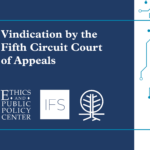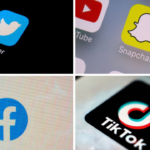
Published May 31, 2022
Can Big Tech companies be treated as common carriers? This is the key question at stake in several current legal battles over states’ efforts to combat Big Tech’s censorship, bias and self-preferencing habits.
As we have argued before, the answer is yes. And the time is now.
Common carrier law, which has historically regulated railroads, telegrams, telephones, cable and other dominant communications and transportation networks, requires equal treatment for users. It is broad, expansive and courts have ruled it consistent with the Constitution for over a century.
Florida and Texas passed statutes last year that require the fair, unbiased treatment of social media users. The Ohio attorney general also brought a lawsuit asking an Ohio state court to declare that Google is a common carrier. Big Tech, of course, opposed all these efforts in the courts.
Now all three battles are coming to a head.
First, two weeks ago, the U.S Court of Appeals for the Fifth Circuit lifted the stay that an Obama-appointed district court judge had placed last December on the Texas social media statute. This law bars social media firms from discriminating against users on the basis of viewpoint, thereby protecting conservatives or others whom the platforms may disfavor. The Texas law is now in force. The Big Tech platforms, represented by their trade group NetChoice, made an emergency appeal to the U.S. Supreme Court, which is now pending.
Then, just last week, the U.S. Court of Appeals for the 11th Circuit in NetChoice v. Florida enjoined on First Amendment grounds Florida’s social media law, which protects journalists from censorship and candidates from de-platforming. However, the judges also upheld major portions of the law, including the nation’s first social media transparency and algorithm disclosure mandates.
Now, the plot thickens. Last Tuesday, an Ohio state judge recognized that Ohio “has stated a cognizable claim…that Google Search is a common carrier,” and rejected Google’s motion to dismiss the Ohio attorney general’s lawsuit.
With these conflicting results—Ohio’s common carriage ruling, the Florida law upheld in part and struck down in part, and the emergency application over the Texas law now pending before the Supreme Court—two pressing legal and policy questions are brought to the fore.
First, can the government regulate internet platforms as “common carriers”—meaning that they are akin to phone companies, and therefore have certain obligations to serve the public without discrimination? These regulations would include the rather mild non-discrimination requirements of the Texas law, wherein social media cannot ban users based on viewpoint. It could also include Ohio’s attempt to bar Google from prioritizing its own products and services in Google Search results.
The 11th Circuit and the Ohio district court came to very different conclusions on the question of common carriage. The 11th Circuit declared social media companies are not common carriers. But it relied upon three flawed arguments, in doing so.
First, the court says that social media companies do not act like common carriers. But federal courts have ruled for over a century that common carrier status is a question of fact for juries to decide—not a question of law for judges. The question simply cannot be answered at this stage in the suit. Second, the 11th Circuit says Supreme Court precedent indicates internet companies are not common carriers. But the Supreme Court has never directly spoken to the issue—with the exception of Justice Thomas’s supportive statements in Biden v. Knight Foundation. Finally, the court claimed that because internet platforms are “interactive computer services” under the Telecommunications Act of 1996, they cannot be regulated as common carriers. But this misreads the statute. Under the Act, the FCC has treated internet service providers, which are also “interactive computer services,” as common carriers—a conclusion upheld by the very decisions the court cites, but apparently failed to read.
In contrast, the Ohio district court provided a scholarly and measured appraisal of common carrier law, in recognizing that “Google’s search function, as a private business, [could affect] the public concern to such an extent that it should be declared a common carrier.” Like it or not, common carriage is still good law—and gives enormous power to the government to impose non-discrimination requirements on firms that play central public functions in our social, economic and political lives. Just as these laws require airlines and phone companies to accept all customers, they can be relied upon to also require social media companies and internet platforms—the gatekeepers of information in our modern society—to treat all users in a non-discriminatory manner.
The second big question at stake in these battles is, regardless of common carrier status, does the First Amendment require governments to permit Big Tech companies to discriminate against users based on viewpoint—or to return biased results, in the case of Google Search? Even if one accepts the 11th Circuit’s First Amendment framework as a given, then at least the Texas law still survives.
The 11th Circuit rightly rejected Big Tech’s argument that the First Amendment requires “strict scrutiny,” a constitutional standard few statutes survive. Instead, the court applied the more lenient “intermediate scrutiny” standard, which means the law is consistent with the First Amendment if it is content-neutral and furthers a substantial government interest. The Ohio state court also recognized that the common carrier duties Ohio seeks to impose on Google would fall under “intermediate scrutiny.”
The Texas law survives “intermediate scrutiny”—assuming an even lower standard, such as “rational basis review,” does not apply. In considering the pending emergency application before it, the Supreme Court should recognize this. Unlike the Florida law, the Texas law only regulates viewpoint discrimination—meaning, bias. It is content-neutral, as it does not favor any particular viewpoint or type of content. In contrast, Florida singles out candidates and journalistic organizations for special legal treatment.
In sum, the answers the law gives on the two questions raised by the battles over states’ efforts to combat Big Tech’s censorship are: Yes, Big Tech companies can be treated as common carriers; and no, the First Amendment does not prohibit them from imposing non-discrimination requirements on internet companies. States thus can, and should, impose such requirements on Big Tech as a reasonable response from the people’s representatives to the genuine threat these companies pose to an undistorted marketplace of ideas.
Adam Candeub is professor of law at Michigan State University and senior fellow at the Center for Renewing America. He was previously acting assistant secretary of commerce for communications and information.
Clare Morell is a policy analyst at the Ethics and Public Policy Center, where she works on the EPPC’s Big Tech Project. Prior to joining EPPC, she worked in both the White House Counsel’s Office and the Department of Justice, as well as in the private and nonprofit sectors.
Photo by Kenny Eliason on Unsplash
Clare Morell is a Senior Policy Analyst at the Ethics and Public Policy Center, where she directs EPPC’s Technology and Human Flourishing Project. Prior to joining EPPC, Ms. Morell worked in both the White House Counsel’s Office and the Department of Justice, as well as in the private and non-profit sectors.












